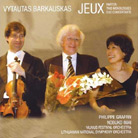November 2005
Vytautas Barkauskas (born 1931) dedicated his Duo concertant to the memory of Sugihara and his wife Yukiko. It is not a preachy work or a lamentation, but music of subtlety, restraint (reflecting the Japanese character) and great originality. The second of its five movements cites the familiar Japanese "Cherry Blossoms" song (Sakura), and the entire work comes across as a gentle benediction, a meditation on the phenomenon of life-affirming kindness for its own sake. Not that it is at all necessary to be aware of Sugihara’s benefactions to enjoy this beautifully wrought music composed for the two soloists, in this recording of the June 2004 premiere. The other work with orchestra, the seven-movement Jeux, was also taped live at its premiere in February 2003, with Philippe Graffin. The violinist’s performance of the much earlier unaccompanied Partita that made the composer’s name early on, is from the same event. The October 2004 Dutch studio recording of the Two Monologues composed for Nobuko Imai is another premiere, though not a public one. Throughout these works, one is happily aware of a creative force that manages to be innovative within an accessible and attractive frame. The sound-world is an embracing one, the unlabored emotional content always rings true, and all the performances have the call of authority and commitment, as one expects from Robertas Šervenikas, the outstanding champion of new orchestral works in his country, and a conductor American audiences must get to know. The sound quality is lifelike and well balanced. GO BACK TO: |
 Barkauskas - Jeux; Partita; Two Monologues;
Duo concertant
Barkauskas - Jeux; Partita; Two Monologues;
Duo concertant